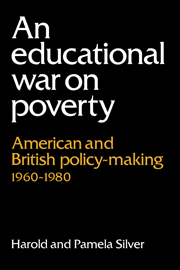Book contents
- Frontmatter
- Contents
- Acknowledgments
- List of abbreviations
- 1 Introduction: a proper complexity
- Part I A pattern of events: United States
- Part II A pattern of events: Britain
- 7 Advancing from poverty?
- 8 Opportunity, equality and social class
- 9 Sounds and silences
- 10 Plowden: direction finding
- 11 Plowden: making choices
- Part III Following through
- Interviews and consultation
- Bibliography
- Index
10 - Plowden: direction finding
Published online by Cambridge University Press: 03 October 2009
- Frontmatter
- Contents
- Acknowledgments
- List of abbreviations
- 1 Introduction: a proper complexity
- Part I A pattern of events: United States
- Part II A pattern of events: Britain
- 7 Advancing from poverty?
- 8 Opportunity, equality and social class
- 9 Sounds and silences
- 10 Plowden: direction finding
- 11 Plowden: making choices
- Part III Following through
- Interviews and consultation
- Bibliography
- Index
Summary
Primary education, wrote Lord Butler in 1968, was a new priority: ‘the interest in primary education has come almost entirely from the Plowden Report’ (B: Butler, 1968, 14). Interest in the Plowden report, which was submitted to the Secretary of State in October 1966, and published the following year, focused on two aspects: its endorsement of ‘progressive’ approaches to the primary school, and its clear recommendations for ‘positive discrimination’ and ‘educational priority areas’ as responses to economic, social, environmental and educational disadvantage. Against the background of existing priority for secondary education, and with a Labour government from 1964 moving towards more determined promotion of a comprehensive secondary school system, the Plowden committee had to determine not only what was distinctive and needed in British primary education, but also the strategies for establishing and communicating the priorities that emerged from its researh, evidence and debate. We are concerned here only incidentally with the committee's explorations of and conclusions concerning the aims and practices of primary education, its staffing or management, though its attention to the stages of education, and particularly questions of transfer, is a link between established and new policy commitments. How the committee arrived at its analysis and recommendations with regard to children and their environment, parents and the community, educational priority areas and positive discrimination, the children of immigrants, health and welfare services, and nursery education, is the direct concern here, since at stake is not only a new public awareness of the realities of primary education, but also the committee's translation of its evidence and analysis in a set of perceptions of the relationship between education and disadvantage.
- Type
- Chapter
- Information
- An Educational War on PovertyAmerican and British Policy-making 1960–1980, pp. 210 - 235Publisher: Cambridge University PressPrint publication year: 1991



